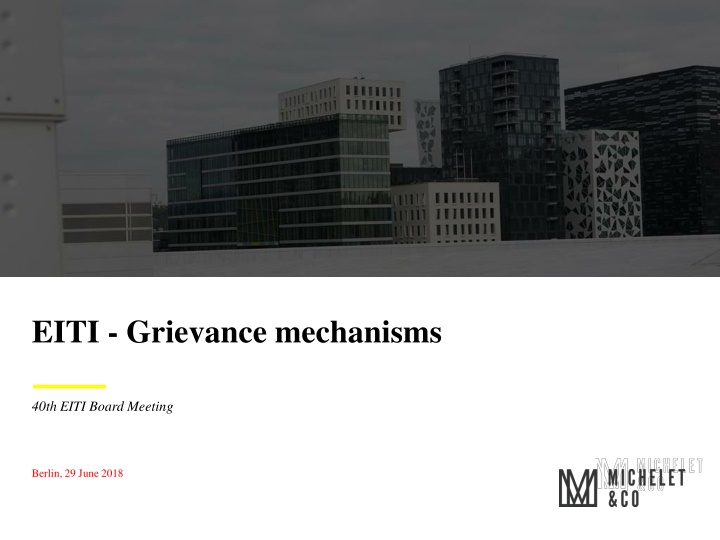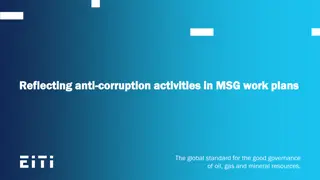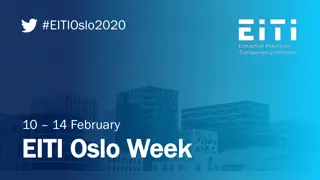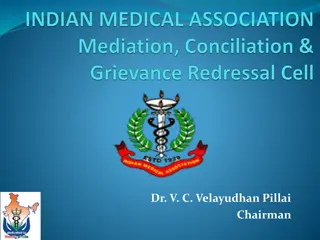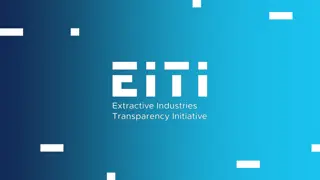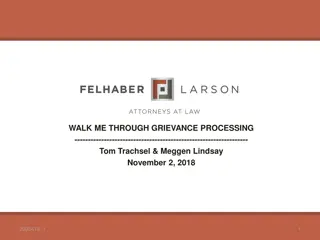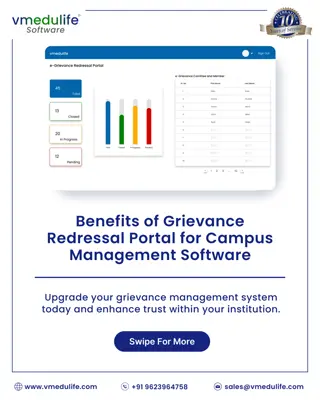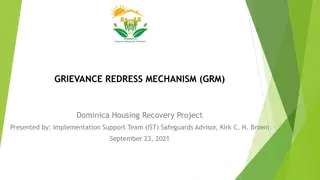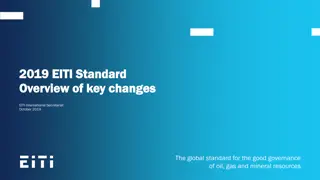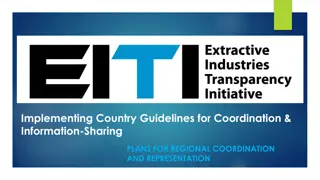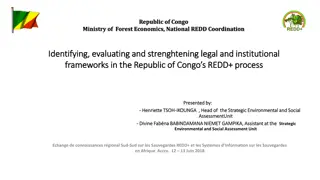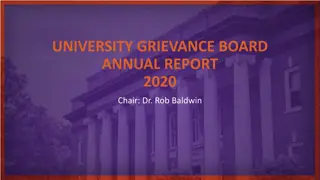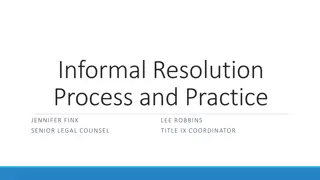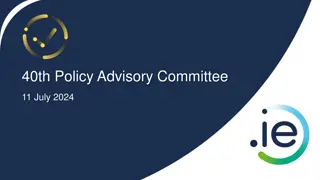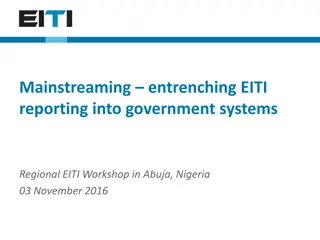Enhancing Grievance Mechanisms in EITI: 40th Board Meeting Insights
Explore the presentation of existing grievance mechanisms at the 40th EITI Board Meeting in Berlin. Discussions centered around whether current procedures meet governance requirements and the potential establishment of new mechanisms. Findings highlighted the need for improved clarity, stakeholder understanding, and communication on the role of various EITI bodies in addressing grievances.
Download Presentation

Please find below an Image/Link to download the presentation.
The content on the website is provided AS IS for your information and personal use only. It may not be sold, licensed, or shared on other websites without obtaining consent from the author.If you encounter any issues during the download, it is possible that the publisher has removed the file from their server.
You are allowed to download the files provided on this website for personal or commercial use, subject to the condition that they are used lawfully. All files are the property of their respective owners.
The content on the website is provided AS IS for your information and personal use only. It may not be sold, licensed, or shared on other websites without obtaining consent from the author.
E N D
Presentation Transcript
EITI - Grievance mechanisms 40th EITI Board Meeting Berlin, 29 June 2018
Two main questions 1. Do the existing grievance procedures fulfil governance requirements? The UN Guiding Principles on Business and Human Rights Board paper 40-7-B 2. Should new special governance mechanisms be established? 2
Existing EITI grievance mechanisms (1) "EITI grievance procedures how to voice your concern" Grievance procedures described in the Articles of Association, the EITI Standard and the Board procedures Described on https://eiti.org/voicing-concerns Overview of how different decisions can be appealed in different ways Generally: Grievances may be brought to the superior body of the subject of the grievance Any stakeholder can write to the Chair requesting that the Members' Meeting considers a matter AoAArt. 8 (1): The Members Meeting shall consider any matter pursuant to request from a Member In practice matters of principle, such as EITI policy or implementation, reconsideration of decisions of Members Meeting, etc. Difficult to implement in practice Members Meeting each third year Any stakeholder can write to the Chair requesting that the Board considers a matter, action or decision taken by the Board or by the Secretariat The Board should treat grievances received with the necessary attention and seriousness If a grievance is directed towards the Chair or a Board Member, that person may not vote in respect of the matter. The Board should also consider whether the person should be present or not If Members are dissatisfied with the Chair or Board Members: They may be replaced by the Members Meeting Special right for implementing countries to appeal decisions in accordance with requirement 8.8 in the Standard 3
Existing EITI grievance mechanisms (2) EITI implementation in a country Overview in Board paper 40-7-B p. 10 Concerns may in the first instance be brought to the attention of the multi-stakeholder group of that country Stakeholders may contact the Board for concerns related to civil society participation Urgent matters: The Board's Rapid Response Committee Violations of the Code of Conduct Shall be brought to the attention of the immediate EITI body (Art. 12) The Draft Constituency Guidelines Complaints should firstly be directed towards the members of that constituency EITI Secretariat internal Grievances about the Secretariat may be raised in writing to the Chair, who considers whether the matter should be addressed by the Board Board Members may raise concerns with the Secretariat in the regular assessments of the Head of Secretariat s performance 4
Do the existing grievance procedures fulfil governance requirements? The findings in Board paper 40-7-B: 1. There is a mismatch between the EITI s existing grievance mechanisms and what some stakeholders understand as grievance 2. The EITI needs to do more to explain the role of Validation as a grievance mechanism 3. The EITI needs to do more to explain the role played by different EITI bodies in grievance 4. More clarity about grievance procedures is needed to improve their accessability A particular need for highlighting and improving grievances over Code of Conduct issues? Strengthen art. 12 of the Code of Conduct? Establish special reporting lines hot lines ? 5
New special grievance mechanisms? Should there be established new special grievance mechanisms? For which grievances? What mechanisms? Defining such grievances is challenging within the EITI The EITI Association is founded and organized to deal with conflicting interests and seek consensus decisions Many grievance matters are of such a nature A main function of the EITI bodies to deal with such matters Introduction of grievance procedures at other levels of the EITI Association would require separate rules and procedures and may require special new institutional bodies to be in accordance with good governance Need for special new dispute resolution mechanisms? Which disputes fall outside the mandates of or cannot be handled within the mandates of the existing EITI bodies? Examples 6
